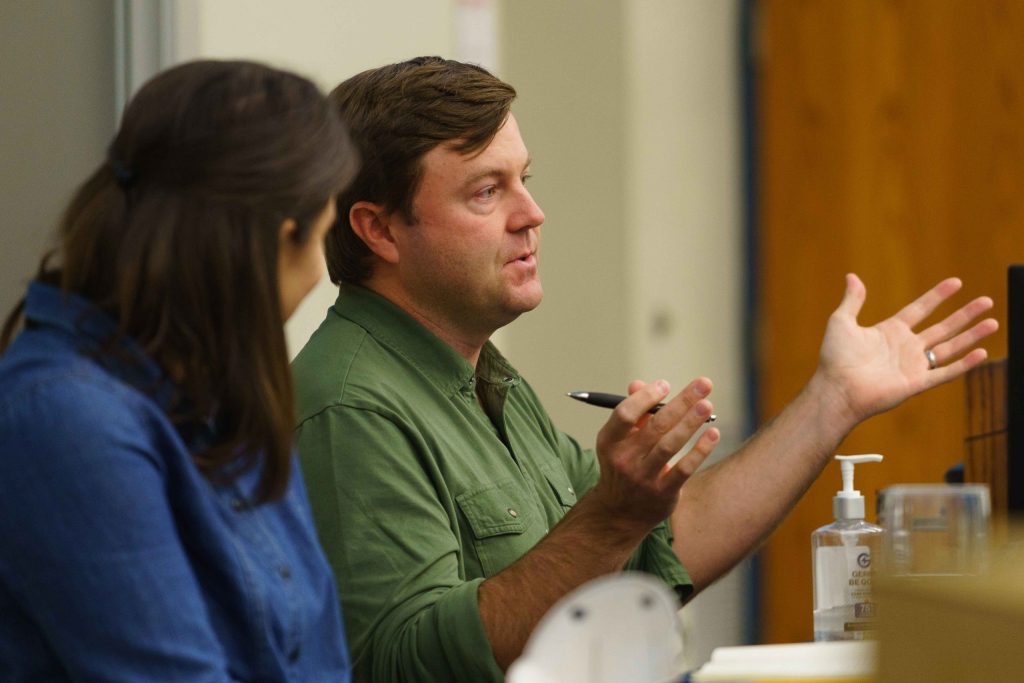In the words of M. Patrick Moore ’07, who served as deputy general counsel to the 2020 Biden for President campaign, “It was a wild ride from start to finish.” Moore recounted his election adventures, alongside campaign senior counsel Danielle Friedman, during a Rappaport Center for Law and Public Policy event at BC Law on November 5.
“We were high enough up that we were making decisions, but low enough down that we were doing the work as well,” Moore explained. That gave the two of them a proverbial front row seat at one of the most unusual elections in American history.
The trouble started when a glitchy new reporting system used by the Iowa Democratic Party caucus malfunctioned, slowing down the first-in-the-nation primary vote results politicians and the media conventionally rely upon as an early glimpse of the race to come.
Moore was one of 12 lawyers present at the caucus. “We were all shepherded into a small room with one television that had CNN playing,” he recalled. “About 15 minutes after that we all start getting phone calls from our respective campaigns saying, ‘What’s going on? There are no results and we aren’t getting any report of results.’” The app, Moore explained, had downloading problems, which caused what he called a “fire festival” and a two-day wait for results.
“No matter what happens,” Moore recalled thinking after the Iowa Caucus boondoggle “at least I will have had this experience. It can’t get weirder than this.”
But it did. In fact, the caucus didn’t even crack his top 50 “most unusual experiences from the campaign on forward.”
Among them was Covid-19, which increased the sense of urgency inherent in any presidential campaign. “Covid was a political issue from the beginning,” Friedman observed. “Our job was not to think about the political side of Covid, but the practical side of running a campaign in COVID.”
Preparation for Trump’s response if he lost also required immense attention and planning. The campaign staff developed an “unconventional challenges team,” which had nightly phone calls to brainstorm how to deal with the potential outlash from a defeated Trump operation. “Sadly,” Moore said, “those efforts are continuing; they sort of have to continue. The Trump folks basically tried every route or avenue at their disposal.”
Mail-in ballots were another challenge. Many first-time voters were sending in their ballots—a more complicated process than going to the polls—which led to a large number of rejections. The Biden team had to come up with a way to ensure that voters were aware of their rejected ballots and given the opportunity to correct them so their votes could be counted.
“We spearheaded this effort in the middle of the summer to get a massive operation going in our battleground states to help voters identify if their ballot had been rejected and then fix it and make sure that their ballot had been counted,” said Friedman. “A huge aspect was finding out how we actually get this data.”
As Moore and Friedman had anticipated, when the election came to a close, a whole new set of challenges emerged with Trump’s refusal to accept defeat. “Unfortunately, the story of the 2020 election is very much what happened after because an incumbent president was unable to accept reality,” said Moore. “But the real story of what happened in 2020 was a miraculous effort by state and local election administrators throughout the country to pull off this election.”
Despite historic challenges, both Freidman and Moore expressed gratitude for the opportunity to be involved and to fight for what they believe is right.
“It is the most fun you can have as a lawyer for a couple of reasons,” said Friedman. “One, the laws that are going to apply to the campaign are constantly evolving, and I think it’s really fun to be a lawyer in a space like that. Two, every campaign is different.”
“There were a lot of moments,” Moore added, “that I was doing the right work and the most fulfilling work that I could be doing. There are only so many legal experiences that you can have about which you feel that way.”


